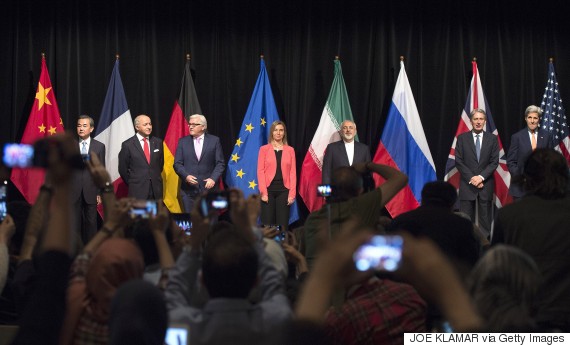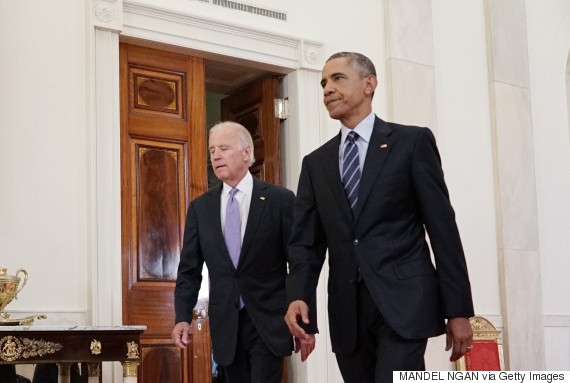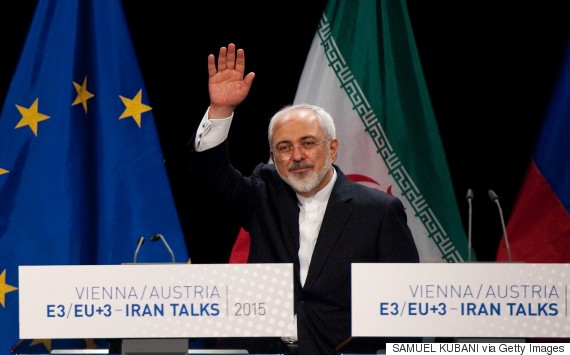Iran reached a historic deal with six world powers on Tuesday that promises to curb Tehran’s controversial nuclear program in exchange for economic sanctions relief.
The accord was announced on Tuesday by Iranian Foreign Minister Mohammad Javad Zarif and the European Union's foreign policy chief Federica Mogherini in a joint statement in the Austrian capital, Vienna.
Zarif acknowledged that the final agreement wasn't perfect, but described the announcement as a "historic moment."
"Today could have been the end of hope," he said, "but now we are starting a new chapter of hope."
The breakthrough comes after months of thorny negotiations between Iran and the so-called P5+1 group -- the five permanent members of the U.N. Security Council and Germany.
U.S. Secretary of State John Kerry made a statement in Vienna, saying "this is the good deal that we have sought."
Kerry stated that while the deal is historic, the implementation is what matters. "I’m not going to stand here and tell you every is going to work without a bump," he said. Kerry added that the deal contains ample mechanisms for ensuring the terms are met, however, and that the agreement makes evident the consequences of non-compliance.

President Obama spoke from the White House on Tuesday, touting the historic importance of the deal and threatening to veto any legislation blocking it. Obama also stated that the terms of the agreement would be enforced. "This deal is not built on trust, it is built on verification," the president stated.
Obama spoke last night with Secretary of State Kerry before the deal was announced, a senior administration official told The Huffington Post. The two also met before Kerry traveled to Vienna and President Obama instructed the negotiating team to not worry about deadlines, according to the official.
Iran's President Hassan Rouhani promoted the merits of the deal in a televised address on Tuesday. Rouhani said that the deal marks a new chapter of relations with the world, calling it a "win-win" result. He also denied that Iran had ever intended to attain a nuclear weapon.

Under the deal, Tehran’s nuclear ability would be significantly limited for more than a decade, The New York Times reported. In return, the six world powers would agree to lift international oil and financial sanctions against Iran.
Tehran would also allow inspectors from the U.N.'s International Atomic Energy Agency (IAEA) to seek visits to Iranian military sites as part of their monitoring duties, a senior diplomat told The Associated Press. However, such visits could be denied or delayed by the Iranian government. In such cases, an arbitration board composed of Iran and the six world powers would have to be convened to determine the right of access.
Yukiya Amano, the head of the IAEA, announced early Tuesday that his organization and Tehran had signed a roadmap. "This is a significant step forward toward clarifying outstanding issues regarding Iran's nuclear program," the IAEA chief said.
In addition, Iran accepted a "snapback" plan that will restore sanctions in 65 days if it violates the accords, Reuters reported.
The deal is the culmination of years of delicate negotiations between formerly bitter enemies U.S. and Iran, as well as negotiators from China, France, Russia, the United Kingdom and Germany.
For more than a decade, international powers have raised concerns that Tehran is using its nuclear enrichment program to build a nuclear weapon. Iran says the program is solely for peaceful purposes such as energy and medicine.
International sanctions imposed over the country’s nuclear work have hampered Iran's economy and in 2013 Tehran agreed to freeze some nuclear activities in exchange for partial sanctions relief.
The 2013 agreement, the first between Iran and the U.S. in more than three decades, paved the way for a framework agreement in April, and Tuesday's comprehensive nuclear accord.

The deal still faces several hurdles. Iran says it won't implement its end of the deal until sanctions are removed and supporters of the nuclear accord fear that prolonged delays could strengthen hardliners in Washington and Tehran.
Opponents of the talks in the U.S. Congress have vowed to thwart any agreement that they deem has not gone far enough to prevent an Iranian nuclear bomb. Congress now has 60 days to review the deal before President Barack Obama can start removing congressional sanctions.
Several Republican lawmakers and presidential candidates were quick to condemn the deal. South Carolina Sen. Lindsay Graham told Bloomberg News that he considers the agreement "far worse than I ever dreamed it could be."
New Jersey Governor Chris Christie also issued a statement criticizing the deal, saying that the "president is playing a dangerous game with our national security."
The deal also has its detractors all over Iran’s neighborhood. The most outspoken of them is Israel, whose leaders have fought hard to obstruct a nuclear accord. They say the deal’s lax restrictions will actually help Iran build a bomb, while sanctions relief will allow Iran to funnel more funds to terrorist groups in the region.
On Tuesday, Israeli Prime Minister Benjamin Netanyahu called the agreement "a bad mistake of historic proportions."
Miri Regev, Israel's culture and sports minister, said the nuclear deal gives the Islamic Republic a "license to kill" and was "bad for the free world (and) bad for humanity," AP reported.
Gulf powers, including Saudi Arabia and the United Arab Emirates, are also wary that their longtime rival will be strengthened by a rapprochement with the international community and have quietly voiced their concerns that a deal with Iran would tip the balance of power in the region.
More from The WorldPost on the nuclear agreement:
- Nuclear Deal Concludes In Historic Announcement- What's In The Nuclear Deal- Former Iranian President: Iran Has Capitulated- Netanyahu Doesn't Need To Read The Iran Deal To Know He Doesn't Like It
